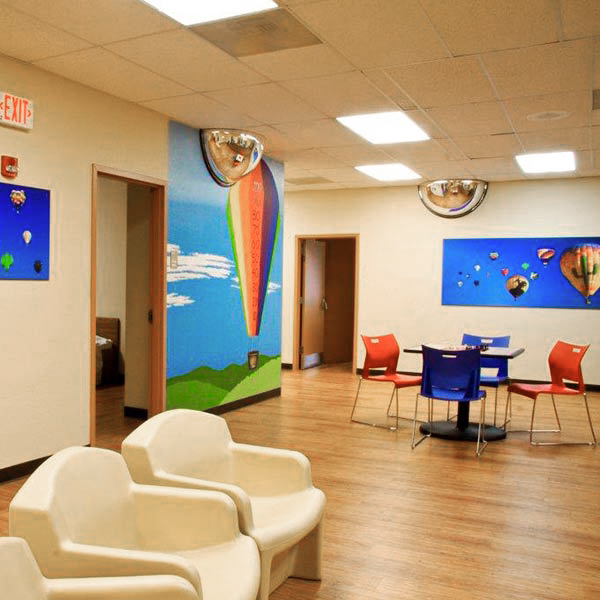Sonora Behavioral Health Hospital is dedicated to providing superior treatment to children, teens, and adults suffering from bipolar disorder. Located in Tucson, Sonora provides the comprehensive care needed to successfully manage mental health disorders and lead a life of recovery.
Treatment for Bipolar Disorder
Learn More About Treatment for Bipolar Disorder
When a person is struggling with episodes of mania and depression, he or she may be suffering from bipolar disorder. A mental health condition that affects millions of people, bipolar disorder can cause a great deal of impairment in functioning if a person does not seek treatment. However, in order to receive the most appropriate treatment, an individual must know which type of bipolar disorder he or she possesses. Bipolar I, the most severe form, involves extreme manic episodes that can render a number of effects, including engaging in risky behaviors that can have permanent consequences. Bipolar II also includes episodes of mania, however the risks involved are not as great. Cyclothymia, the least severe form of bipolar disorder, is characterized by mood disturbances, though a person’s functioning may not be as impaired. While some people with bipolar disorder may feel as if there is no relief from these debilitating symptoms, there are effective treatment options available that can restore normal functioning.
Sonora Behavioral Health, a 140-bed leading acute inpatient psychiatric hospital in Tucson, is a premier provider of treatment for children, adolescents, and adults suffering from bipolar disorder. We acknowledge the unique needs of patients who are struggling with mental health concerns and diligently work with patients and their families in working towards recovery. With programming that is designed to address every aspect of mental health conditions, like bipolar disorder, we at Sonora implement treatment modalities and techniques geared towards alleviating distressing symptoms and restoring healthy functioning.
Helping a Loved One
Helping a Loved One or Family Member Get Treatment
Seeing a friend or loved one struggle with episodes of mania and depression may be confusing for those in the person’s life. You may see erratic behaviors that do not seem to make sense. You may wonder if bipolar disorder is what your loved one is suffering from as you see him or her fluctuate in mood. Here are some symptoms of bipolar disorder that may help you identify this condition in your friend or loved one:
- Manic episode:
- Rapid speech
- Decreased need for sleep
- Poor impulse control
- Hypersexuality
- Grandiose feelings
- Substance abuse
- Depressive episode:
- Dulled responses to stimuli
- Increase in sleeping
- Social isolation
- Decline in participating in activities once enjoyed
- Self-harm
- Suicidal ideation
If your friend or loved one presents with these symptoms, it is a good idea to seek professional help to reduce the effects of this mental illness. By remaining a source of support and encouragement, educating yourself on bipolar disorder, and considering treatment options, you can be a great help in aiding your friend or loved one in recovering from this debilitating mental health condition.
Why Choose Us
Why Consider Treatment at Sonora Behavioral Health
Untreated bipolar disorder can lead a person to have more interaction with the legal system, unable to maintain employment or achieve academically, experience financial problems, become addicted to drugs or alcohol, or even begin to self-harm. For those struggling with this mental disorder, it can feel as though life is spinning out of control. Damage to interpersonal relationships can happen as the impulsivity and destructive behaviors that come with this condition can negatively affect those in the person’s life. Lastly, and because the symptoms are so severe, those with untreated bipolar disorder are at a greater risk of suicide attempts and the possibility of suicide completion.
Our inpatient treatment center is known for being extremely effective in treating bipolar disorder. When taking part in treatment for bipolar disorder at our treatment center, individuals are away from everyday stressors and can focus solely on recovery and healing. If medication is deemed appropriate, a person with this mental illness has access to qualified medical staff that can help determine the most appropriate medication that can minimize the most debilitating symptoms. Furthermore the therapeutic process involved in inpatient treatment allows an individual to gain a better understanding of his or her condition, while learning new ways of managing symptoms. A type of treatment that has changed many lives, inpatient care has put countless people on the track towards lasting recovery from bipolar disorder.
Philosophy & Benefits
Bipolar Disorder Treatment Philosophy and Benefits
As the leading psychiatric hospital in Tucson, we make it our mission to provide behavioral healthcare services that meet the unique needs of each patient. We employ proven and evidence-based treatment modalities and techniques that teach effective coping skills that can be used for a lifetime. Our experienced and qualified staff diligently works to provide comprehensive medical and psychiatric assessments, diagnostic services, and treatment. By treating acute illnesses in a sensitive and caring manner, Sonora’s staff is able to assist patients in regaining and maintaining their highest level of functioning.
Types of Treatment
Types of Treatment Offered at Sonora Behavioral Health Hospital
Upon arrival at our treatment center, each patient who comes to us for bipolar treatment will complete an initial assessment that will include a physical examination, collection of medical history, psychiatric evaluation, and psychological assessment. During this time, we will also identify social skills, cultural and family issues, and determine any other needs that each patient may have. We use a multidisciplinary approach with each patient and our psychiatric clinical team is composed of psychiatrists, psychiatric nurses, social workers, therapists, internists, and expressive art therapists who are all trained and experienced in treating individuals with emotional health and substance abuse issues. All treatment plans are individualized and include the following methods:
Medication management: Some people require medication to alleviate the debilitating symptoms of bipolar disorder. When pharmaceutical intervention meets the needs of a patient, medical staff, including nurses and psychiatrists, will work with the individual in exploring this option for treatment. Furthermore, individuals prescribed medication are monitored so as to ensure that proper medication is being administered to alleviate distressing symptoms.
Group therapy: At our psychiatric hospital, our main form of treatment is daily group therapy sessions. We use solution-focused groups that teach patients a variety of skills needed to recover from bipolar disorder. Some of our group topics include sleep, hygiene, coping skills, stress management, self-awareness, relaxation, and self-help skills training.
Family meetings: Family members are involved in all aspects of the treatment process and receive education about their loved one’s condition. In addition, family members are in constant communication with case managers throughout their loved one’s stay.
Additional treatment methods may include the following:
- Expressive therapy, including art therapy
- Recreation therapy
- Daily meetings with social worker
- Weekly dietary groups
Continuing Care
Continuing Care and Levels of Treatment
The discharge planning process begins as soon as a patient is admitted to our hospital. Within 48 hours of admission, a social worker will evaluate each patient for available resources including placement, transportation, and aftercare treatment. When it is time for the patient to leave inpatient treatment, the social worker will coordinate placement with the patient, family members, outside agencies, or private insurance. They will also coordinate transportation from the hospital on the day of discharge to the patient’s next placement as well as aftercare treatment appointments based on individual needs of each patient.
For adult patients that no longer require inpatient treatment, Sonora Behavioral Health Hospital offers outpatient treatment that consist of nine to twelve hours of group therapy a week. These groups allow participants to process real-life scenarios as they happen and get the support they need, as well as practice the new techniques that they are learning. These eight to twelve weeks of intensive treatment give participants the chance to use group to work through emotional and psychological issues that keep them locked in a state of distress. Through our outpatient treatment, patients learn techniques that they will continue to use for the rest of their lives to stay healthy and happy.
Our partial hospitalization program (PHP) and our intensive outpatient program (IOP) allow patients to live at home and attend school or go back to work while still receiving the treatment that they need. PHP is held 5 days a week for 6 hours a day, while IOP is held 3 days a week for 3 hours a day. Both programs have a mental health and chemical dependency track. In addition to PHP and IOP, we have an aftercare program for alumni held monthly for as long as the patient needs.
All of the services at Sonora Behavioral Health encourage patient success as individuals navigate the process of healing and recovery. For those suffering from bipolar disorder, Sonora can be the beginning of a life free from the symptoms and negative effects of this mental health condition.














